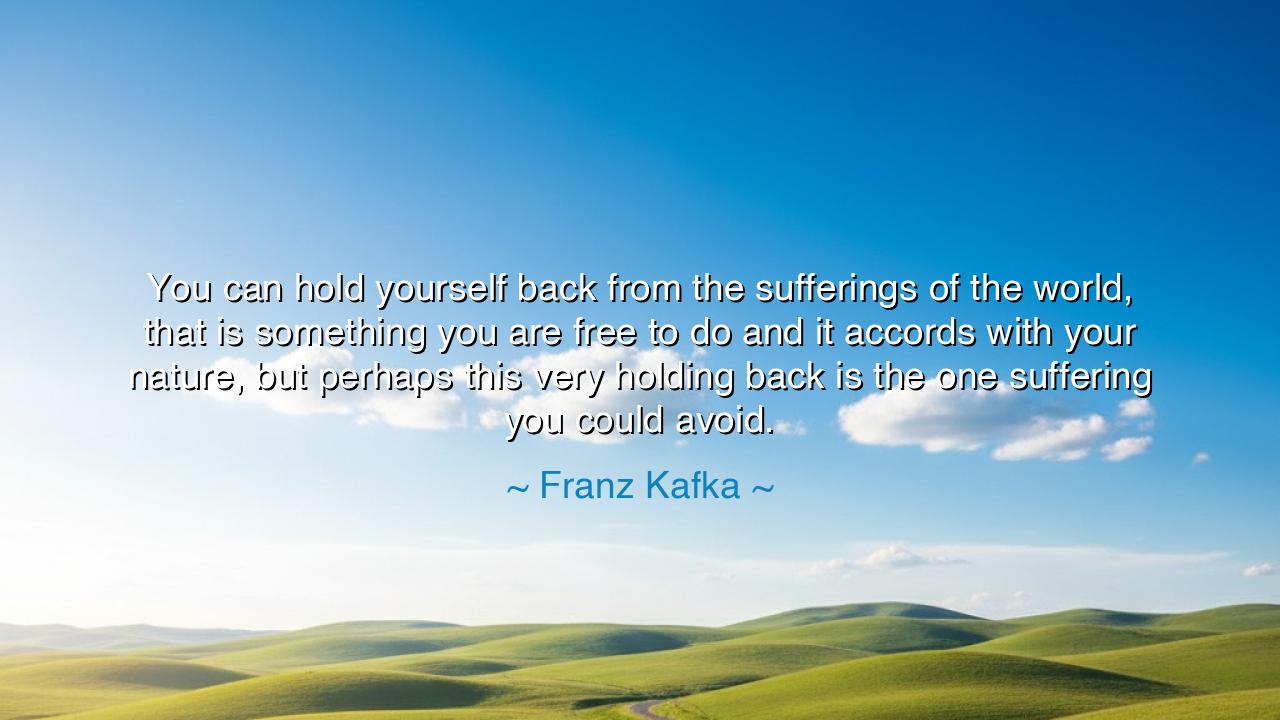
You can hold yourself back from the sufferings of the world
You can hold yourself back from the sufferings of the world, that is something you are free to do and it accords with your nature, but perhaps this very holding back is the one suffering you could avoid.






Hearken, O seekers of wisdom and contemplators of the human soul, to the words of Franz Kafka, who pondered: “You can hold yourself back from the sufferings of the world, that is something you are free to do and it accords with your nature, but perhaps this very holding back is the one suffering you could avoid.” In these words lies a meditation on the paradox of detachment and engagement, the weight of fear and the liberation of participation. The ancients recognized that life offers both refuge and challenge, and that wisdom lies in discerning which sufferings are avoidable and which are essential for the soul’s growth.
Kafka’s insight illuminates the tension between self-preservation and empathy. To withdraw from the pain of the world is natural, a defense of the self against sorrow, disappointment, and grief. The ancients, from Stoics to Confucian sages, acknowledged that restraint shields the heart, yet they also warned that excessive withdrawal leads to an impoverished spirit, a life untested by the realities that shape courage, compassion, and understanding. Kafka suggests that in holding back, we may create a suffering born not of the world, but of our own avoidance.
The phrase “accords with your nature” reminds us that avoidance is instinctive; the human heart recoils from pain. Yet Kafka intimates a deeper truth: the act of turning away from the world’s hardships, though seemingly protective, carries its own burden. The suffering we might evade—the discomfort, the sorrow, the moral struggle—is replaced by a hollow isolation, a life that is untouched by the transformative power of engagement. The ancients recognized that suffering, when met consciously, forges strength and wisdom.
Consider the significance of engagement. To step into the world’s suffering is to acknowledge the interconnection of all lives, to practice empathy, and to bear witness to reality. It is in this confrontation that meaning and growth arise. History offers examples: Florence Nightingale, who tended the sick during the Crimean War, could have withdrawn from the horrors she encountered. Yet by immersing herself in suffering, she transformed tragedy into healing, courage, and reform, illustrating Kafka’s paradox that participation can prevent a subtler suffering of the heart.
Kafka’s meditation also carries moral weight. To avoid the world’s pains entirely is to deny oneself the lessons embedded in hardship: patience, resilience, and insight. The ancients taught that virtues are cultivated not in comfort, but in the crucible of challenge. By holding back, one may preserve the body, yet the spirit suffers a quiet atrophy. Engagement, though perilous, allows suffering to be transmuted into wisdom and compassion, a gift not only to oneself but to others.
O listener, perceive the lesson here: suffering is not solely a burden to be avoided, but a teacher to be encountered. Kafka warns that withdrawal, while free and natural, carries its own cost, the cost of untested courage and unfulfilled empathy. The path of life demands discernment: some sorrows must be faced to cultivate the strength and understanding that define a full and meaningful existence.
Practical guidance flows from this meditation. Reflect upon the ways you may be holding back from the challenges, injustices, or hardships around you. Ask whether this avoidance truly preserves your spirit or quietly diminishes it. Engage consciously where you can offer empathy, service, or witness, transforming the suffering you encounter into growth, understanding, and purpose.
Thus, O seeker, engrave this wisdom upon your heart: freedom lies not merely in avoidance, but in the courage to engage. Kafka’s words remind us that the sufferings we face directly are not always our heaviest burdens; it is often the sufferings we avoid, the withheld engagement with life, that wound the soul most deeply. Embrace the world, endure its trials, and allow suffering to illuminate the path to compassion, wisdom, and true resilience.






AAdministratorAdministrator
Welcome, honored guests. Please leave a comment, we will respond soon